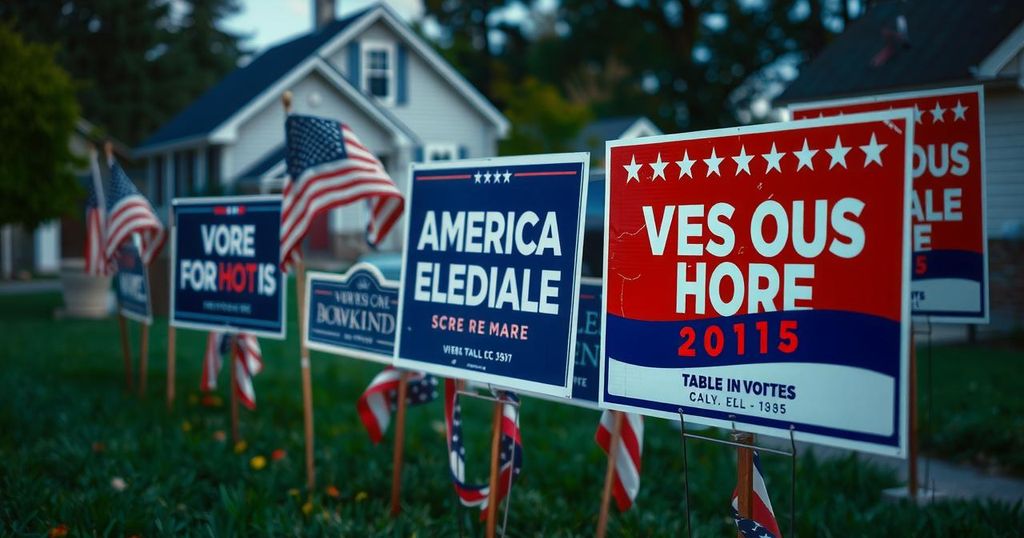The Cultural Significance of Yard Signs in American Elections: A Newcomer’s Perspective

The article explores the author’s observations of American election yard signs as a newcomer to the United States, specifically in Maine. It contrasts the informality and accessibility of these signs with the more formal advertising methods seen in other countries. The author reflects on their personal journey from an outsider to an active voter, emphasizing the significance of these signs in expressing political identity and participation in the democratic process.
As a recent immigrant to the United States, and particularly to the state of Maine, I have encountered numerous elements of the electoral process that invoke both surprise and intrigue. Now participating in my second presidential election, I cannot help but reflect on how uniquely different this experience is compared to elections I have previously observed worldwide. My inaugural voting experience in 2020, during the contest between Donald Trump and Joe Biden, was characterized by a tumultuous blend of anxiety and excitement. Approaching another election, I find myself again wrestling with apprehension regarding the outcome, coupled with an undeniable excitement surrounding the act of casting my vote. One of the most captivating aspects of the American electoral process, particularly for someone new to the culture, is the prevalence of yard signs. A drive through Maine in the lead-up to an election reveals a landscape adorned with these signs, resembling a seasonal display akin to blooming flowers. For newcomers like myself, they serve as an informal introduction to local candidates, illustrating a spectrum of races from school boards to congressional seats. Additionally, they provide an intriguing glimpse into the political sentiments of my neighbors as they display their allegiance to various presidential candidates and political parties. This election season marks my initial participation in this cherished American tradition, as I have placed a Harris-Walz sign in my yard, while my neighbors display a sign supporting Trump-Vance. There is a peculiar satisfaction in traversing the neighborhoods and counting the signs; it feels like a light-hearted game. This medium serves as a subdued yet emphatic means for individuals to broadcast their political affiliations—something which I have not encountered in my prior experiences abroad. During my time in Nairobi, Kenya, elections were notably devoid of yard signs. Instead, there were expansive billboards and banners featuring the candidates’ images prominently displayed in public spaces and on public transport. Although these visuals were polished and authoritative, they lacked the personal resonance that American yard signs embody. Here, such signs appear to be an extension of individual identity, a public affirmation of belief in a particular candidate. What resonates profoundly is the informal and accessible nature of this tradition. In the United States, expressing one’s political views does not require one to belong to a political elite; a humble yard sign is capable of conveying a message just as powerfully as a large campaign event. This tradition serves as a compelling reminder that, in this nation, every voice bears significance, devoid of the constraints imposed by wealth or influence. As a new citizen, I regard these signs as emblematic of the democratic spirit itself—a tactile reminder of the hard-won rights I now possess. In many regions globally, elections can engender fear and conflict, yet here, despite the anxiety inherent in the electoral season, there persists a palpable sense of freedom, empowerment, and pride. I relish being part of a system that not only permits me to vote but also encourages me to publicly express my views through something as simple as a yard sign. The lengthy and intense nature of election seasons in the United States fosters a unique buildup of excitement, anticipation, and occasionally, stress. It is heartening to witness a culture that promotes civic engagement through open discussion and debate. As I prepare for my second presidential election, I am reminded of the invaluable lessons gleaned from my initial voting experience—patience, hope, and the understanding that my vote carries weight. Although the yard sign in my front yard may appear modest, it symbolizes my journey from an observer to an active participant in the democratic process, representing an experience truly profound.
The piece reflects on the author’s personal experiences as a newcomer to the United States, specifically observing the electoral culture surrounding yard signs during elections. The contrast with electoral customs in their home country is highlighted, particularly focusing on the informal and accessible nature of American political expressions through yard signs. The significance of these signs is elaborated upon, representing broader themes of democracy, civic engagement, and personal identity in the electoral process.
In summary, the article underscores the author’s journey as a new citizen engaging with the American electoral process through an appreciation for yard signs as a unique cultural phenomenon. It highlights the informal and accessible nature of political expression in America, contrasting it with the author’s previous experiences abroad. Ultimately, the yard sign becomes a powerful symbol of the author’s civic identity and newly acquired rights, encapsulating their feelings of empowerment and participation in the democratic process.
Original Source: www.pressherald.com








